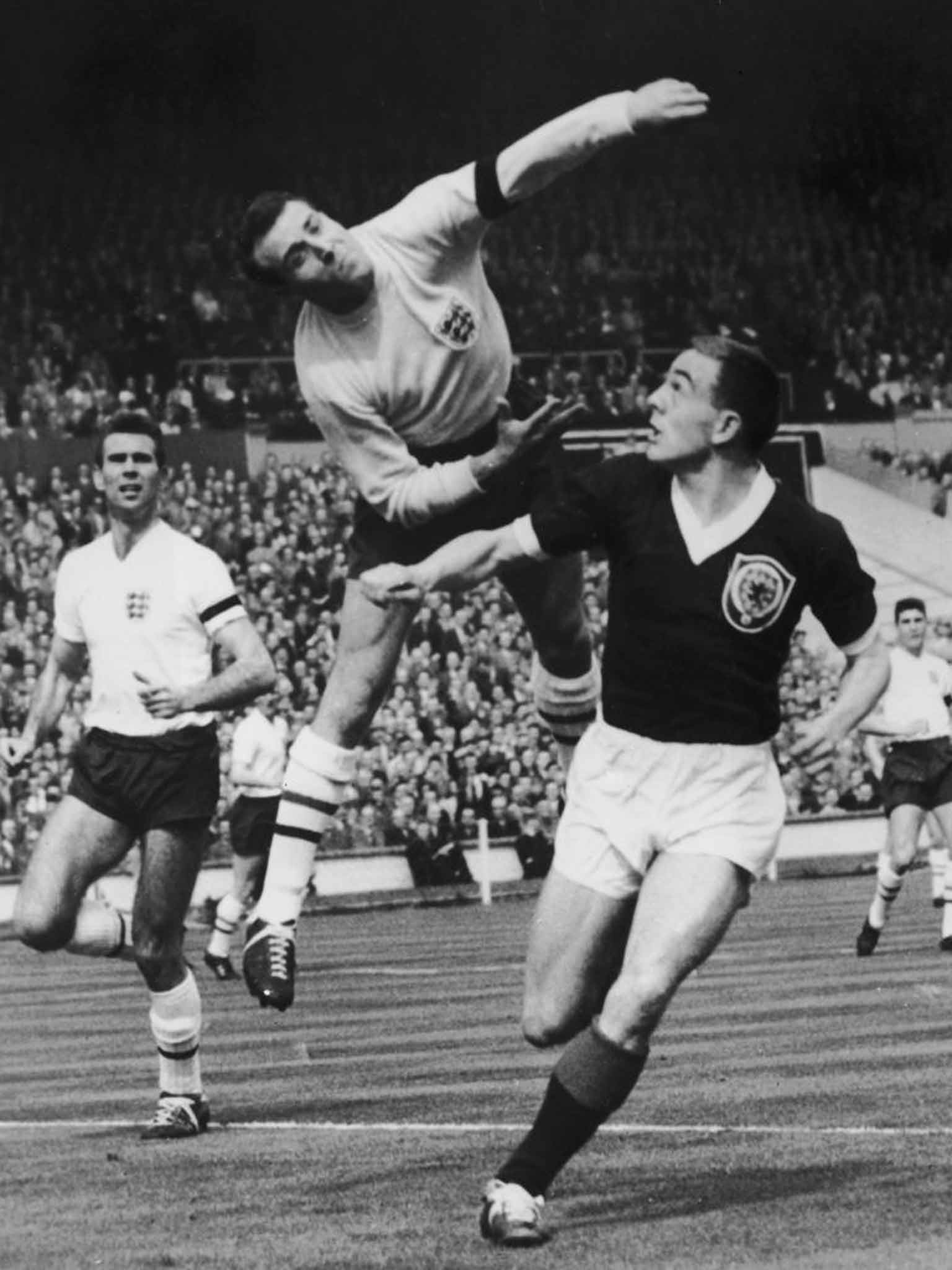Ron Springett: Brave and agile goalkeeper who shone for England and became part of the World Cup-winning squad of 1966
He was adept at choosing the precise moment to smother shots at the feet of attackers, accepting that such plunges would result in occasional injuries

Sheffield Wednesday's Ron Springett was the leading English goalkeeper of the early 1960s before Gordon Banks took over the mantle and earned footballing immortality as a World Cup winner. Small for a net-minder at 5ft 9 and a half inches but whose agility, courage and positional work were exceptional throughout a nine-year Hillsborough sojourn, he peaked in 1960-61 for both club and country. He excelled consistently as the Owls finished as League title runners-up to Tottenham Hotspur, who also won the FA Cup that season, and as England struck a majestically dominant vein of form.
The lithe Londoner's 33 full caps constituted a national record for a keeper until he was overhauled by the brilliant Banks, and he also made nine appearances for the Football League in games of international standard.
Though at a distinct disadvantage when confronted by hulking centre-forwards, Springett met the threat cleverly and courageously, adept at choosing the precise moment to smother shots at the feet of attackers, accepting with characteristic phlegmatism that such plunges would result in occasional injuries. Swift of foot, deftly assured with his hands and adept at judging when to leave his goal-line, he could be a gloriously entertaining performer, though for all his acrobatics, his lack of height occasionally made him vulnerable to sudden long shots.
Born and raised near Craven Cottage, Springett was rejected in his teens by Fulham as not big enough but, a determined character, he continued to develop his game in local football while making his living as a fitter's mate. That resolve and self-belief paid off in February 1953 when he signed for third-tier Queen's Park Rangers, for whom his father and fellow goalkeeper, Percy, had played at junior level.
Springett was beaten by two penalty kicks on his senior entrance at home to Norwich City in November 1955, but soon showed outstanding mettle and was an ever-present first-teamer in 1956-57, his burgeoning potential recognised by selection for the Third Division South's annual clash with its northern counterpart.
Bigger clubs were attracted, but at first he was reluctant to leave his home city, his £10,000 transfer to Sheffield Wednesday in March 1958 completed only after the persuasive Owls manager Eric Taylor allowed him to train in London initially, then head north for matches.
Despite arriving too late to avert Wednesday's relegation from the top flight, Springett was an instant success at the higher level and he starred as Taylor's team bounced straight back up as Second Division champions in 1958-59.
The England coach, Walter Winterbottom, was so impressed by the 24-year-old's progress that he called him up to replace Bolton Wanderers' Eddie Hopkinson between his country's posts against Northern Ireland at Wembley in November 1959, and the debutant contributed a penalty save from Jimmy McIlroy to a 2-1 victory. That personal triumph was a tribute as much to the thoroughness of his preparation as his athleticism, as he kept a notebook in which recorded the preferred spot-kick methods of all his leading opponents.
Springett moved into his prime, striking up a productive understanding with centre-half Peter Swan for Wednesday and England, hugely influential as the Yorkshiremen mounted the most meaningful opposition to Spurs' all-conquering exploits of 1960-61, and Winterbottom's men prepared for the 1962 World Cup finals in Chile in convincing fashion.
However, he experienced mixed fortunes in the tournament, particularly in the 3-1 quarter-final defeat by Brazil in which he made three stupendous stops before failing to deal with two wicked long-distance swervers from the great Garrincha. The first he could only parry to Vava, who scored, and the second left him helpless. In mitigation, Garrincha was a genius and the lighter ball used in Chile did tend to swirl unpredictably.
Soon Springett was supplanted by Banks as England's first choice, but he remained a bulwark for Wednesday, featuring prominently in their run to the 1966 FA Cup final, which they lost 3-2 to Everton after leading 2-0. That summer he was an enthusiastic and supportive back-up to Banks in Alf Ramsey's squad as England lifted the World Cup, although he did not receive his winner's medal until 2009, when non-playing members were finally honoured.
Having made nearly 400 appearances as an Owl, Springett rejoined QPR in May 1967, valued at £16,000 in an unusual deal which saw his younger brother Peter, yet another goalkeeper in the family, move in the opposite direction, with Rangers also pocketing a £35,000 cheque.
Back at Loftus Road, Ron remained a high-quality operator, missing only a handful of matches as Rangers were promoted to the top flight in 1967-68 for the first time. Retiring as a professional in 1969, he continued to play, but as a centre-forward for a Sunday league team. The invariably cheerful Springett, one of whose daughters, Terry, was also an England international, later ran a sports shop and decorating and gardening businesses.
Ronald Derrick Springett, footballer: born Fulham 22 July 1935; played for Queen's Park Rangers 1953-58 and 1967-69, Sheffield Wednesday 1958-67; capped 33 times by England 1959-66; married Barbara Hillsdon (two daughters); died 12 September 2015.
Join our commenting forum
Join thought-provoking conversations, follow other Independent readers and see their replies
Comments